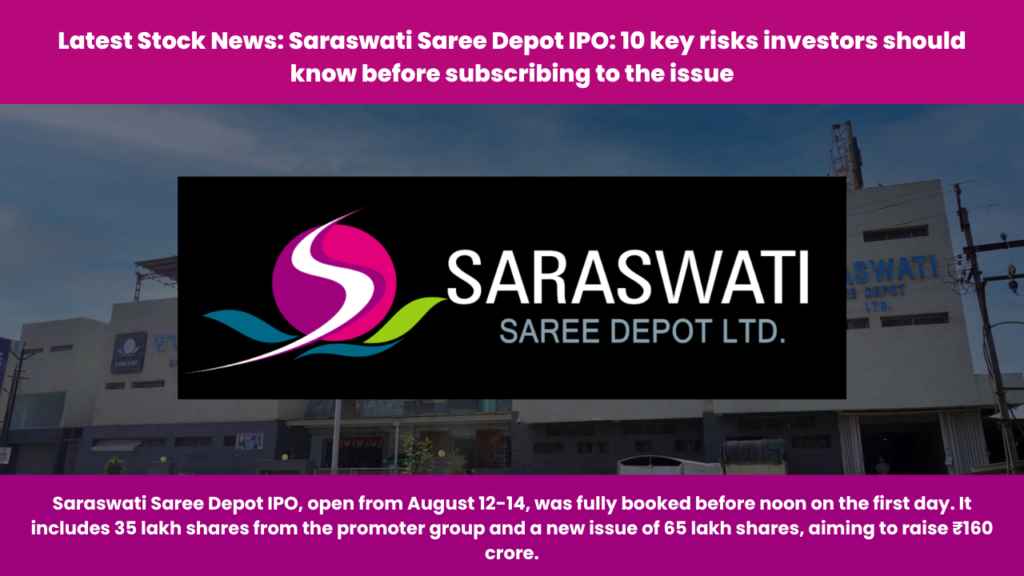Saraswati Saree Depot IPO,which began today, August 12, will run through August 14. The retail section portion was fully booked in the first hour itself, followed by qualified institutional investors and non-institutional investors. The issue was completely booked before noon on the first day of bidding.

Along with an Offer for Sale (OFS) of 35 lakh equity shares by the promoter group, the IPO consists of a new issue of up to 65 lakh equity shares. An IPO amount of ₹160 crore is set at the high end of the pricing band. The business plans to use the net proceeds of the new offering to pay for general corporate objectives and working capital requirements.
Saraswati Saree Depot IPO has reserved not more than 50% of the shares in the public issue for QIB, not less than 15% for NII, and not less than 35% of the offer is reserved for retail investors.
The Kolhapur-based firm was founded in 1966 and first focused on the saree industry. Today, it also sells various women’s clothing items in bulk, including kurtis, dress materials, blouse pieces, lehengas, and bottoms.

The firm has established connections in major cities such as Surat, Varanasi, Mau, Madurai, Dharmavaram, Kolkata, and Bengaluru by sourcing sarees from various producers around India.
As per the red herring prospectus (RHP), the company’s listed peers are Go Fashion (India) Ltd (with a P/E of 71.80 times), and Sai Silks (Kalamandir) Ltd (with a P/E of 21.34 times).
Here are some of the key risks listed by the company in its Red-Herring Prospectus (RHP):
- Due to its heavy reliance on the selling of women’s sarees, the company’s operations are susceptible to changes in consumer demand. Any shifts in customer preferences might have a negative impact on their operations, financial situation, and business.
- The firm operates out of Ulhasnagar and Kolhapur, two locations in Maharashtra. Any localised social disturbance, natural catastrophe, service outage, or other natural disaster in Maharashtra or its surrounding areas, as well as any production stoppage or store closure, might have a materially negative impact on their company and financial situation.
- The company’s operation in the wholesale market means that they don’t have direct visibility or contact with the end users of their products, which might negatively impact their capacity to cultivate end user awareness and brand loyalty.
- The business of the corporation is seasonal. Reduced revenue during the fiscal year’s holiday season can have a negative impact on a company’s operations, prospects, financial situation, and business.
- The firm sources its items from third-party suppliers and weavers. The company may not be able to obtain enough quantity or quality of goods from its weavers/suppliers in a timely manner and at a reasonable price because they do not have long-term or exclusive agreements in place. This could have a negative impact on the company’s operations, financial situation, and business results.

- The firm needs a substantial amount of working capital to continue growing because it is in the wholesale market. The company’s operational outcomes might suffer if they are unable to satisfy their working capital requirements.
- During the previous three fiscal years, the company’s operating, investing, and financing operations have resulted in negative cash flows. Future negative cash flows would have a detrimental impact on their financial situation and operational outcomes.
- The company’s business, cash flows, operational results, and financial health might all suffer if any new goods it introduces don’t do as well in the market as planned.
- The business depends on outside transportation companies to deliver its final goods, thus any delays in delivery or mishaps on the part of these companies might have a negative impact on business operations.
- The firm relies only on suppliers and weavers to make all of its items; it does not produce any of its own goods. Due to their reliance on outside manufacturers to produce all of its goods, the firm is exposed to risks that might negatively impact their operations, cash flows, business, and financial situation if they come to pass.
Disclaimer: The views and recommendations above are those of individual analysts, experts and broking companies, not of 24Onlive . We advise investors to check with certified experts before making any investment decision.


